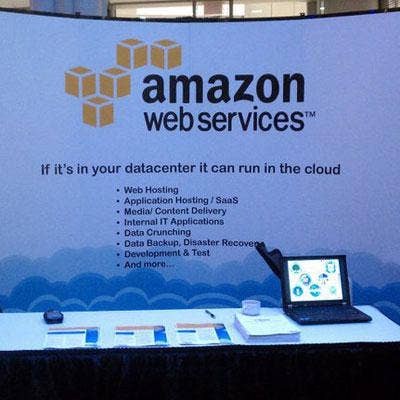6 Ways Amazon Web Services Does Things Differently From 'Old Guard' Enterprise Vendors

The New Guard
Amazon Web Services has built a $6 billion-plus run-rate cloud business by doing things differently from what its executives often describe as "old guard" enterprise vendors. It's easy to see why: Amazon's roots are in retail, so it's approaching the cloud from a much different perspective than vendors like IBM, HP, Oracle and Microsoft, to name a few.
In many ways, AWS isn't selling just technology, but a new way of buying and consuming technology.
"We view what we're doing as changing the enterprise -- it's allowing them to move much more quickly, it's allowing them to innovate at a time where a lot of enterprises have stopped feeling like they were able to innovate," Andy Jassy, senior vice president of AWS, told CRN in a recent interview.
Following are six examples of why AWS does things differently from traditional enterprise vendors.

1. Simple Building Blocks
Enterprise vendors sometimes make their products and services more complex than they need to be. Some are obsessed with bundling products into suites and pitching them to customers as cost-saving mechanisms.
AWS set out from the beginning to keep its cloud infrastructure services as simple as possible, according to Jassy. "We wanted to build highly flexible, feature-poor, primitive building blocks," he told CRN in mid-July.
Some enterprise vendors want customers to use their products and services in certain ways, and construct them accordingly. But AWS decided it would be best to offer basic services and let customers figure out what to do with them, according to Jassy.
"We didn't want to make those decisions for developers; we wanted them to be able to stitch them together however they saw fit," Jassy said.

2. Not Ripping Off The Government
Jassy said AWS now has about 2,000 government agencies using its services, including NASA Jet Propulsion Laboratory, the Navy and the Central Intelligence Agency. He says one of the big attractions for government customers is AWS' pay-as-you-go pricing model -- in contrast with traditional enterprise vendors' multi-year licensing agreements, which require customers to project upfront how much cloud software they'll need.
"The government -- and enterprises in general -- is very much hoping that they're going to be able to consume a lot of the software they consume in the model that AWS and the cloud has made more pervasive," Jassy said.
Government agencies used to have problems buying cloud services because they didn't have procurement vehicles that enabled them to take advantage of AWS' frequent price cuts, according to Jassy. That's something AWS is helping them figure out, he added.
"We're working to evolve the acquisition models so that they can consume the cloud the way AWS is providing it, and which lets them enjoy the cost savings, and price decreases over time," Jassy said.

3. Culture Of Self-Evaluation
Like any company, AWS looks for people who can invent and build new, innovative products and services. That said, folks with huge egos -- and who aren't able to admit when they're wrong -- probably aren't a good fit for the AWS culture.
"We like people here that are what we call 'vocally self-critical' -- it's one of our leadership principles," said Jassy. These are people who have humility and who are honest about the things they're doing that are working well, and about the things they're doing that are not working well. And then are self-reflective and want to improve and learn in the areas that are going well."
Jassy said AWS wants people that can take ongoing ownership of the products and services they develop, as opposed to just complete one project and then focus on the next.
"Companies that are able to be honest about what's not working, and that have visibility into what's not working early enough so they can course correct quickly, have a much easier time of continuing to evolve than ones that have their heads in the sand and always want good news," said Jassy.

4. Hiring 'Missionaries'
When AWS was hiring its initial team of 57 people, Jassy said it looked for ones who didn't adhere to the established thinking set out by incumbent enterprise vendors. AWS also looked for team players -- a term that gets tossed around a lot in the industry, but has a specific meaning in the context of building cloud services.
"One of the things I love about the team I get to work with is, it's a very missionary team," Jassy said. "There are lots of companies that have success but the teams are really mercenary ... or about an individual. The AWS team is very missionary. They're extremely passionate about what we're trying to do."

5. No One Is Bigger Than The Team
When AWS was hiring its first employees, Jassy said, it looked for a mix of people who'd been at Amazon for a while and ones who could bring valuable, instructive experience from outside. Most of all, though, AWS sought to hire people who could put their own egos aside and function within the framework of a team.
"I think anybody who has been a part of a business that had some success and traction will tell you, it's never an individual -- it's always how well the team is able to come together," Jassy said. "It's about the talent you have on that team -- and more importantly, whether the team can gel around a certain set of tenets and principles, and work together well and execute as a team. That is absolutely the case at AWS. Both the beginning team, and the current team, is really a very talented group of people that work well together."

6. Building For Speed
Amazon has built its business for speed, and that's evident in the way AWS develops products and services. One of the ways AWS does this is by organizing itself into autonomous product teams that include both technology-related and non-technology-related resources, said Jassy.
"It takes the right type of organizational structure, and you need the right types of leaders, and the right types of people," Jassy said. "You need the mechanisms to inspect how quickly you're delivering, and to be continually looking at problems, and how you can actually break problems apart to move more quickly.
"I think we built a real culture on the team around bias for action and iterating and delivering really quickly for our customers. You can say you want to deliver quickly, but to do it isn't so easy," said Jassy.